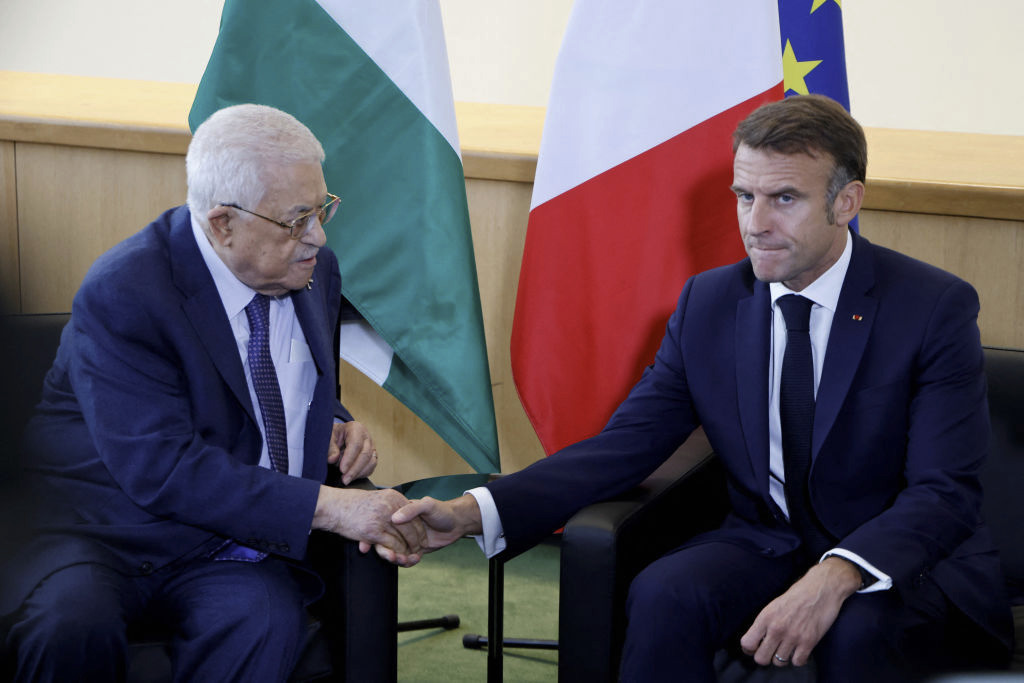
On 24 July 2025, France announced its decision to recognize the existence of a "Palestinian state" in September. President Emmanuel Macron portrayed this move as an act of "justice" and "peace." In reality, however, this recognition constitutes a geopolitical fiction — contrary to international law, flagrantly at odds with the facts on the ground, and laden with profoundly harmful moral implications.
1. What State?
International law — particularly Article 1 of the 1933 Montevideo Convention — defines the criteria for statehood: a permanent population, a defined territory, an effective government, and the capacity to engage in relations with other states. Yet neither of the two Palestinian political entities meets these criteria.
On one side stands the Palestinian Authority (PA), headed by Mahmoud Abbas—a feeble administrative remnant, ostentatiously corrupt, loathed by his people and devoid of democratic legitimacy. No presidential election has been held since 2005. The PA's limited authority extends over only a portion of the West Bank, and even there, it operates with the conditional consent of Israel and under the close oversight of the Israeli military, on which it depends for its own security.
On the other side lies the Gaza Strip, controlled by the Islamist organization Hamas, designated as a terrorist group by the European Union, the United States, Canada, the United Kingdom, Australia, and Japan. Hamas, which perpetrated the massacre of October 7, 2023, is not a state actor, but a theocratic militia. It is waging war not only against Israel but also against Mahmoud Abbas's Fatah faction. Hamas, in a coup, forcibly expelled the Palestinian Authority from the Gaza Strip in 2007 in a Palestinian civil war that has claimed hundreds of lives over the years.
Thus, the "Palestinian state" that France purports to recognize possesses no unified government, no monopoly on the legitimate use of force, and no effective sovereignty. It exists solely on the papers of a few diplomatic offices — not in reality.
2. What Territory?
Recognizing a state entails recognizing its control over a territory — even if disputed at the margins. Yet here too, confusion reigns, and for good reason: Palestinian territorial claims are anything but coherent. The 1949 armistice lines (frequently but mistakenly called the "1967 borders") have never been recognized as international boundaries, either by Israel or by key UN resolutions, including Security Council Resolution 242 of 1967. That resolution calls for withdrawal to "secure and recognized boundaries" but leaves their definition open.
Hamas, by contrast, rejects any notion of coexistence with Israel. Its founding covenant from 1988 (revised in 2017) continues to call explicitly for Israel's destruction, and the 2017 revision claims all the land "from the River Jordan in the east to the Mediterranean in the west" — that is, all of Israel, the West Bank and Gaza. This vision necessarily entails the eradication of the State of Israel and the displacement — or extermination — of its people.
To recognize a state with no defined territory — and whose territorial claims involve ethnic cleansing — is to lend legitimacy to a genocidal project.
3. What Authority?
Since the launch of Israel's Operation Swords of Iron in response to the jihadist slaughter of October 7, 2023, Hamas has lost control over large portions of the Gaza Strip. The IDF now conducts daily operations there, systematically dismantling Hamas's military infrastructure and administrative apparatus. The so-called Hamas "government" no longer possesses functioning ministries, a budget, or significant logistical capability. Its leadership is either dead, exiled, or in hiding.
In the West Bank, the Palestinian Authority has lost credibility. It is widely perceived as corrupt, authoritarian and subservient to Israel. It controls neither borders nor resources. It cannot even maintain public order in many areas, such as Jenin and Nablus, which have devolved into strongholds of lawless paramilitary factions.
In sum, there is no Palestinian authority exercising sovereign control over any territory.
A Legal Fiction, a Moral Disaster
Under international law, the recognition of a state is a sovereign act — discretionary, but not arbitrary. It presupposes, in principle, the existence of objective facts demonstrating a genuine state within the legal meaning of the term. By choosing to recognize a "Palestinian state" that clearly fails to meet these established criteria, France departs from any international law. Macron's declaration is not a matter of legal recognition, but a political gesture — ideological and electoral — masquerading as diplomacy.
The timing only compounds the problem. One year and eight months after the atrocities of October 7, 2023 — acts of barbarism targeting civilians, including women, children, the elderly and even babies — this recognition serves as a reward for terrorism. It offers no humanitarian benefit. As US President Donald Trump put it: "What Macron says is irrelevant—it won't change anything." The sole concrete outcome is the political legitimization of a jihadist, anti-Semitic, genocidal movement.
For those who still doubt that reality, Hamas leaders have articulated their aims with chilling clarity. In an interview on October 24, 2023 with Lebanese television channel LBC, Ghazi Hamad, a member of Hamas's political bureau, declared:
"We must teach Israel a lesson, and we will do this again and again. The Al-Aqsa Flood is just the first time, and there will be a second, a third, a fourth, because we have the determination, the resolve, and the capabilities to fight."
When asked whether this meant the annihilation of Israel, he responded without hesitation: "Yes, of course."
Once again, France finds itself on the wrong side of history. Not on the side of human rights. Not on the side of peace. But on the side of lies, dishonor and collaboration with the enemies of humanity.
Drieu Godefridi is a jurist (University Saint-Louis, University of Louvain), philosopher (University Saint-Louis, University of Louvain) and PhD in legal theory (Paris IV-Sorbonne). He is an entrepreneur, CEO of a European private education group and director of PAN Medias Group. He is the author of The Green Reich (2020).


